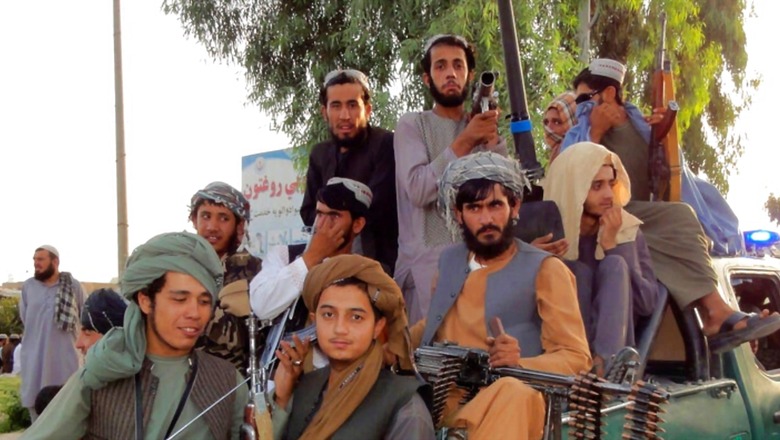
views
The Taliban have seized power in Afghanistan two weeks before the United States was set to complete its troop withdrawal after a costly two-decade war. The insurgents stormed across the country, capturing all major cities in a matter of days, as Afghan security forces trained and equipped by the US and its allies melted away. For the first time since retaking power in Afghanistan, the Taliban’s leaders on Tuesday sketched out what their control of the country could look like, promising peace at home and urging the world to look past their history of violence and repression. “We don’t want Afghanistan to be a battlefield anymore — from today onward, war is over,” said Zabihullah Mujahid, the Taliban’s longtime chief spokesman, in a news conference in Kabul, the capital. While the Taliban claim to not repeat the excesses of their previous rule, not many are convinced.
News18 takes a look at where Afghanistan stands right now and the future course for the nation:
WHAT IS HAPPENING IN AFGHANISTAN?
The Taliban, a militant group that ran the country in the late 1990s, have again taken control. The US-led invasion of Afghanistan in 2001 ousted the insurgents from power, but they never left. After they blitzed across the country in recent days, the Western-backed government that has run the country for 20 years collapsed. Afghans, fearing for the future, raced to the airport, one of the last routes out of the country.
WHY ARE PEOPLE FLEEING THE COUNTRY?
People are worried that the country could descend into chaos or the Taliban could carry out revenge attacks against those who worked with the Americans or the government.
Many also fear the Taliban will reimpose the harsh interpretation of Islamic law that they relied on when they ran Afghanistan from 1996 to 2001. Back then, women were barred from attending school or working outside the home. They had to wear the all-encompassing burqa and be accompanied by a male relative whenever they went outside. The Taliban banned music, cut off the hands of thieves and stoned adulterers.
The Taliban have sought to present themselves as a more moderate force in recent years. Since taking over, they have promised to respect women’s rights, forgive those who fought against them and prevent Afghanistan from being used as a base for terror attacks. But many Afghans are sceptical of those promises.
WHY ARE THE TALIBAN TAKING OVER NOW?
Probably because US troops are set to withdraw by the end of the month.
The US has been trying to get out of Afghanistan, its longest war, for several years now. American troops ousted the Taliban in a matter of months when they invaded to root out al-Qaida, which orchestrated the 9/11 attacks while being harboured by the Taliban. But it proved more difficult to hold territory and rebuild a nation battered by repeated wars.
As the US focus shifted to Iraq, the Taliban began to regroup and in recent years took over much of the Afghan countryside.
Last year, then-President Donald Trump announced a plan to pull out and signed a deal with the Taliban that limited US military action against them. President Joe Biden then announced that the last troops would leave by the end of August. As the final deadline drew close, the Taliban began a lightning offensive, overrunning city after city.
WHY ARE PEOPLE COMPARING AFGHANISTAN TO THE FALL OF SAIGON?
The Fall of Saigon to North Vietnamese forces in 1975 marked the end of the Vietnam War. It became an enduring symbol of defeat after thousands of Americans and their Vietnamese allies were airlifted out of the city on helicopters. US Secretary of State Antony Blinken has rejected any comparisons to Afghanistan, saying: “This is manifestly not Saigon.”
WHAT WILL HAPPEN NEXT IN AFGHANISTAN?
The Taliban say they want to form an “inclusive, Islamic government” with other factions. They are holding negotiations with senior politicians, including leaders in the former government.
They have pledged to enforce Islamic law but encouraged women to join their government and say they will provide a secure environment for the return of normal life after decades of war.
But many Afghans distrust the Taliban and fear that their rule will be violent and oppressive. Afghans are also concerned about the breakdown of security after thousands of prisoners were freed and security forces melted away in the face of the Taliban advance.
Ashley Jackson, in an opinion for the New York Times, says the Taliban broadly face a choice: “Lay siege, seek revenge and destroy the vestiges of the post-2001 intervention or absorb what they can and strike deals with those people and factions that can be persuaded to cooperate. It’s not clear even the Taliban know what they want here. Aware that the world is watching, their political leadership is eager to counter negative press and avoid becoming a pariah state, as it was in the 1990s.”
She adds that one real test for the Taliban will be whether they can govern — and govern with — those who radically disagree with them. Recent history offers the lesson that exclusionary political settlements do not hold: Afghanistan is too large and diverse, and exclusionary politics has repeatedly sowed conflict. This was just as true in 2001, when the Taliban was excluded from the Bonn Agreement, which reconstituted the Afghan state after the US invasion, as it was in the 1990s, when the Taliban refused to accommodate its adversaries.
WHAT ABOUT THE ECONOMY?
Afghanistan’s economy is “shaped by fragility and aid dependence”. That is the troubling overview set out by the World Bank several months before the Taliban takeover. Economic prospects look even more precarious now, as future financial assistance is under a cloud of uncertainty.
German Foreign Minister Heike Maas told the broadcaster ZDF last week: “We will not give another cent if the Taliban takes over the country and introduces Sharia law.” Other aid donors are sure to be watching developments closely.
Security and severe problems with corruption are behind another persistent problem in Afghanistan: very weak foreign business investment.
WHAT DOES THE TALIBAN TAKEOVER MEAN FOR WOMEN?
Many fear it could mean a severe rollback of rights. Afghan women have made major gains since the overthrow of the Taliban. Many are worried they will once again be confined to their homes. The Taliban have said women’s rights will be respected under Islamic law, without providing much detail. The status of women varies across the Muslim world and often within a single country. Afghanistan has always been very conservative, especially outside major cities.
WILL THE TALIBAN ONCE AGAIN HARBOR AL-QAIDA?
The Taliban have pledged to prevent Afghanistan from being used as a base for attacks on other countries, a key U.S. demand enshrined in the 2020 peace deal.
But American military officials are worried.
Earlier this year, the Pentagon’s top leaders said an extremist group like al-Qaida may be able to regenerate in Afghanistan, and officials are now warning that such groups could grow much faster than expected.
On the other hand, technological advances over the last 20 years allow the US to target suspected militants in countries like Yemen and Somalia where it does not have a permanent troop presence. The Taliban paid a heavy price for their role in the Sept. 11 attacks and likely hope to avoid a repeat as they seek to consolidate their rule.
Afghanistan is also home to an Islamic State group affiliate that has carried out a wave of horrific attacks targeting its Shiite minority in recent years. The Taliban have condemned such attacks and the two groups have fought each other over territory, but it remains to be seen whether a Taliban government will be willing or able to suppress IS.
Read all the Latest News, Breaking News and Assembly Elections Live Updates here.


















Comments
0 comment